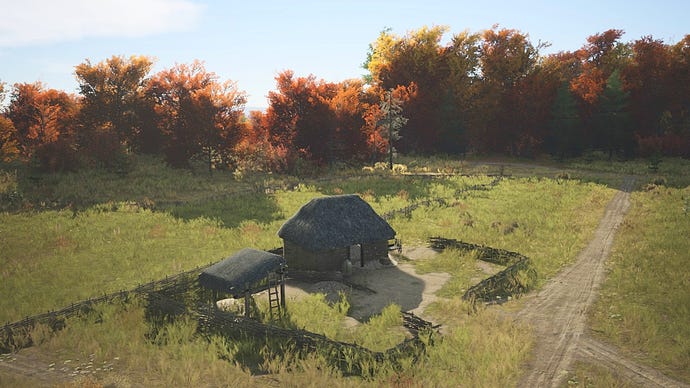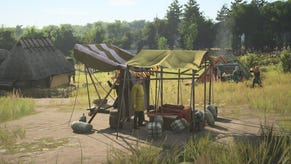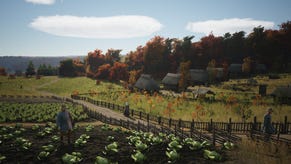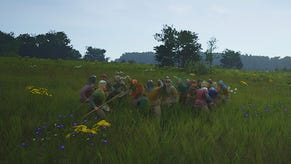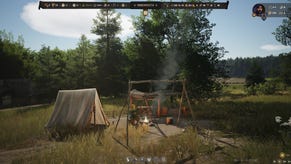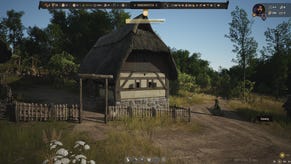Manor Lords beginner's guide: What to know before you start
The do's and don'ts of life as a medieval lord
A Manor Lords beginner's guide is almost essential. Slavic Magic's strategy game throws plent of choices at you with little context and no indication how your actions might affect the settlement's future. It's easy to make the wrong choice early, so we've put together this little reference to help steer you in the right direction.
Our Manor Lords beginner's tips guide explains some common mistakes to avoid and what you should do first to set yourself on the road to prosperity.
Family management
Manor Lords uses family units instead of individual workers. Whole families can specialize in specific trades and even open a market stall to peddle their wares, but you should actively reassign families as needed. The biggest struggle in your first year is having enough people to build and manage all your necessary structures, and the best way to handle that situation is to shuffle your families around.
If you don’t need logs, for example, move those workers to the sawpit or trading post or wherever else needs someone to keep things going. Also, keep at least one family unassigned at all times so you have someone to handle your construction projects. Two would be ideal, but that’s not always possible in your first few months.
Plan carefully
It’s okay to space stuff out. The tempting thing to do at first is to just group everything together, but you end up running out of space for improvements later – especially when it comes to burgage plots.
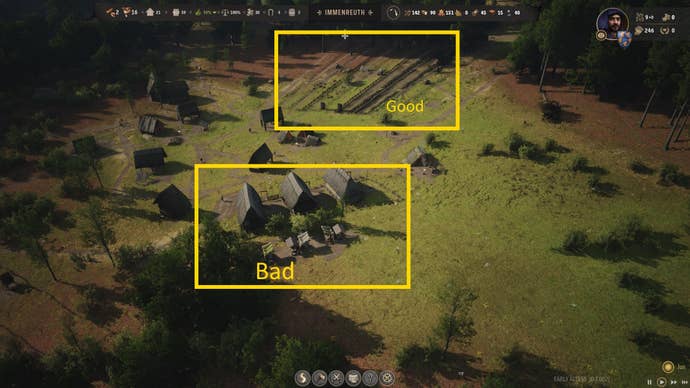
Try creating districts, where your logging and sawing industries are together, ideally near sources of wood, your market has room to grow, and you have plenty of free space for agriculture and residential areas.
Upgrade your plots
Manor Lords doesn’t tell you this unless you investigate for yourself, but you can – and should – upgrade your burgage plots. Select the plot you want to upgrade, and, assuming you have enough space, you can click the gear icon to build add-ons. These include veggie gardens and hen coops. It’s a convenient way to boost your food supplies without sticking an entire family on another hunting or foraging plot, and you can sell the excess at the trading post.
You can eventually upgrade the plots to higher levels, which accommodate more families and generate passive income.
To market
Building a market keeps families happy and gives them access to food and small means of making money, but it has a negligible effect on their overall prosperity. Accumulating wealth only happens at the trading post, where you offload surplus goods and, eventually, import items you can’t produce for yourself. Regional wealth is the only kind you can tax, so selling unwanted materials as soon as you can is a good idea.
If you’re selling food, just make sure not to get rid of too much.
It's also a good idea to buy a horse for your trading post, as it increases the speed of foreign trade with merchants. That means you get paid faster.
You’re the red one
Video games almost always use red to denote enemies and other hostiles, but Manor Lords flips it around and makes red your color. Your buildings aren’t marked or highlighted by default, so it’s easy to get lost. I say this because I spent 10 minutes lost on the zoomed out map, wondering where my tiny little settlement was in the sea of untamed wilderness.
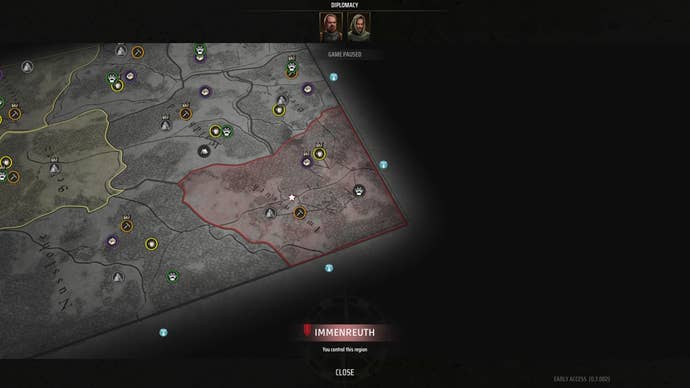
You can also press the left Shift key if any building is underway to point out the general area of where your people are.
Speed it up
This one is probably common sense to 4X veterans, but if you’re new to the genre, don’t hesitate to fast-forward. Manor Lords’ slow, sedate pace is refreshing, but when you need to just get things done and progress a bit, it’s helpful to quadruple the game’s speed so you’re not spending all day waiting for simple tasks to finish.
Build a Woodcutter’s Camp for fuel
Survival in Manor Lords uses food and fuel. Fuel is firewood until you start branching out into other forms of the stuff, so make sure you build a woodcutter’s camp early. Sawpits are essential for the planks you need to build better structures, but you should divide your log supply between the sawpit and the camp to make sure you have enough fuel once the cold sets in.
You can eventually unlock charcoal from the development menu and build a charcoal kiln, which is twice as efficient at producing fuel compared to the woodcutter’s camp.
Build your manor
You’d think in a game called Manor Lords that building your manor would be kind of a big deal, but the early access launch version forgets to tell you to actually build it. Once you reach small village status, click the Administration tab of the building menu, and select your manor. Some of the features are blocked off for now, but build a decent-sized house with some walls, and you’re good to go.
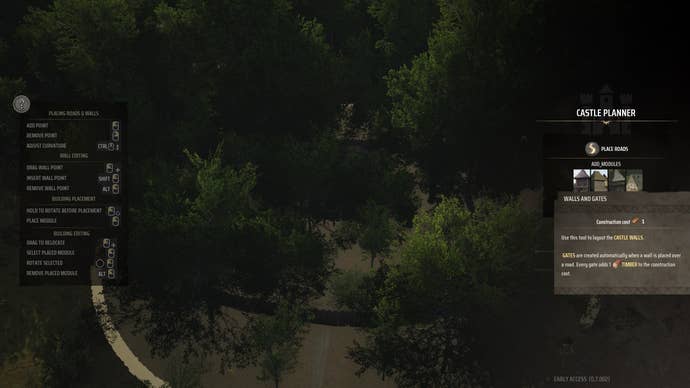
Building a manor is the only way to start taxing your people, which gives you funds for diplomacy and other large-scale ventures.
Build a storage shed
Manor Lords starts you with a few random piles of stuff and yells at you to build a storage shed so the food won’t spoil. And you should. These starting supplies don’t last forever, but they keep you going while you’re getting started. It’s worth devoting your limited supply of logs in the long run, but you don’t have to keep the storage hut staffed with a family at all times.
Forage, forage for your life
Literally. In my experience, almost every starting region has at least one berry deposit, and unless you somehow end up in a district that’s overflowing with animals, berries are your main – or only – food source for the first year. Crops take a long time to grow, and a single animal habitat won’t support a growing village during the winter.
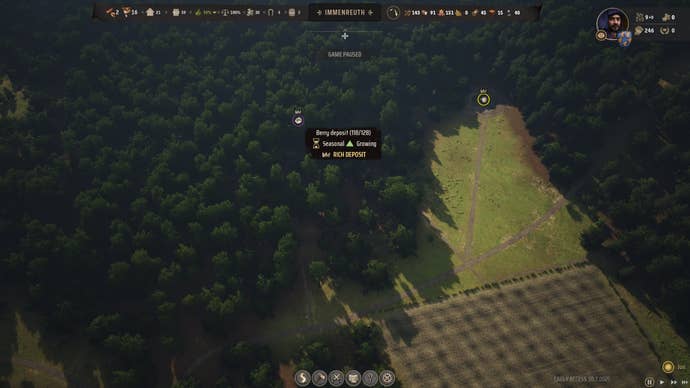
You should have the resources to build a foraging hut in by the time your first summer rolls around, and with one or two families assigned, it should keep you well supplied until winter. Unless you’ve expanded your burgage plots too quickly, that one berry patch is enough to see you through to the following spring. You can enact a fasting policy to preserve food supplies if things get dire, but the people won’t like you for it.
The early church gets more souls
I joked in my early access overview about building a church to keep people happy, but it’s a true scenario. A church is the easiest way to boost approval with hardly any investment on your part aside from the initial building materials. More approval means you wait less for newcomers to move in – assuming you have enough plots for them – and more families make building and generally functioning much easier.
You don’t have to staff the church, either. Assigning a family there just makes gravedigging duties a thing, which you don’t really need unless things take a very bad turn.
